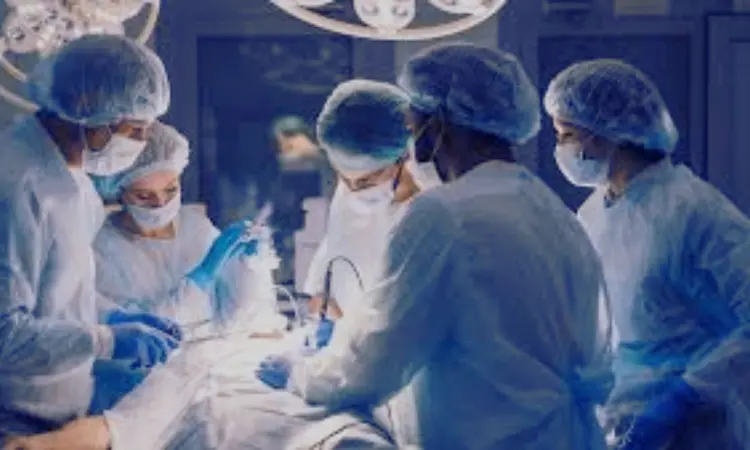- Home
- Medical news & Guidelines
- Anesthesiology
- Cardiology and CTVS
- Critical Care
- Dentistry
- Dermatology
- Diabetes and Endocrinology
- ENT
- Gastroenterology
- Medicine
- Nephrology
- Neurology
- Obstretics-Gynaecology
- Oncology
- Ophthalmology
- Orthopaedics
- Pediatrics-Neonatology
- Psychiatry
- Pulmonology
- Radiology
- Surgery
- Urology
- Laboratory Medicine
- Diet
- Nursing
- Paramedical
- Physiotherapy
- Health news
- Fact Check
- Bone Health Fact Check
- Brain Health Fact Check
- Cancer Related Fact Check
- Child Care Fact Check
- Dental and oral health fact check
- Diabetes and metabolic health fact check
- Diet and Nutrition Fact Check
- Eye and ENT Care Fact Check
- Fitness fact check
- Gut health fact check
- Heart health fact check
- Kidney health fact check
- Medical education fact check
- Men's health fact check
- Respiratory fact check
- Skin and hair care fact check
- Vaccine and Immunization fact check
- Women's health fact check
- AYUSH
- State News
- Andaman and Nicobar Islands
- Andhra Pradesh
- Arunachal Pradesh
- Assam
- Bihar
- Chandigarh
- Chattisgarh
- Dadra and Nagar Haveli
- Daman and Diu
- Delhi
- Goa
- Gujarat
- Haryana
- Himachal Pradesh
- Jammu & Kashmir
- Jharkhand
- Karnataka
- Kerala
- Ladakh
- Lakshadweep
- Madhya Pradesh
- Maharashtra
- Manipur
- Meghalaya
- Mizoram
- Nagaland
- Odisha
- Puducherry
- Punjab
- Rajasthan
- Sikkim
- Tamil Nadu
- Telangana
- Tripura
- Uttar Pradesh
- Uttrakhand
- West Bengal
- Medical Education
- Industry
Case Report Highlights Internal Hernia as a Rare Complication of Laparoendoscopic Single-Site Surgery

Jayadeva Institute’s New Cardiac Care Vision
Saudi Arabia: A recent case report in BMC Nephrology describes an unusual instance of a trans-mesenteric internal hernia occurring after laparoendoscopic single-site surgery in a 32-year-old male patient.
Laparoscopic donor nephrectomy, introduced in 1995, revolutionized kidney extraction by offering a minimally invasive alternative to traditional open surgery. Over the years, it has become the preferred approach, particularly for living donor nephrectomies. More recently, laparoendoscopic single-site surgery (LESS) has emerged as an even more refined technique, using a single incision instead of the four typically required in traditional laparoscopic procedures.
While various studies have highlighted common risks associated with these surgeries, such as vascular issues, intraoperative organ injury, and postoperative ileus, less attention has been given to rarer complications. One such rare but serious complication is the internal hernia, which can result from LESS. Though uncommon, internal hernias pose significant risks, including bowel obstruction, ischemia, and necrosis, making them a critical concern for surgical teams.
Anas Aboalsamh, College of Medicine, King Abdulaziz University, Jeddah, Saudi Arabia, and colleagues described the case of a 32-year-old male, weighing 59 kg and with a height of 167 cm, presented as a kidney donor with a history of irritable bowel syndrome (IBS), for which he only took medication during flare-ups. He had no previous surgeries, blood transfusions, allergies, or active infections, and his clinical and laboratory parameters were normal.
The patient underwent a LESS donor nephrectomy the following morning, which proceeded without major issues, although a minor complication arose: a mesenteric defect was created while mobilizing the left colic flexure. Due to its size, the defect was deemed unlikely to result in a hernia and was left unclosed. The patient had an uneventful postoperative course, tolerating oral feeding and passing flatus, and was discharged the same day in good condition.
However, one day later, the patient returned to the emergency room (ER) with abdominal pain. He was treated with IV fluids and analgesia but left against medical advice. On day 3 post-op, he presented again with abdominal pain, nausea, and vomiting. CT scans revealed small bowel obstruction (SBO) caused by a herniation through the mesenteric defect. Laparoscopic exploration confirmed herniation through the defect, which was repaired using V-Lock monofilament stitches. The patient recovered well, was discharged after two days, and followed up in outpatient care, reporting good progress.
Although hernias are a recognized complication of laparoscopic donor nephrectomy, internal hernias (IH) following laparoendoscopic single-site surgery are rarely reported in the literature. The study highlights this uncommon occurrence of IH after LESS, suggesting that mesenteric defects during the procedure may be more prevalent than previously acknowledged and often under-reported or underestimated.
"Given the unpredictable nature of IH, we recommend closing mesenteric defects to mitigate the risk of herniation. Additionally, the study demonstrates that re-exploring and addressing IH using the minimally invasive LESS technique is safe and conducive to early recovery, reinforcing its value in managing such complications," the authors concluded.
Reference:
Aboalsamh, A., Bassi, Y., Alhabib, R.K. et al. Internal hernia following laparoendoscopic single site surgery: a case report. BMC Nephrol 25, 395 (2024). https://doi.org/10.1186/s12882-024-03815-4
Dr Kamal Kant Kohli-MBBS, DTCD- a chest specialist with more than 30 years of practice and a flair for writing clinical articles, Dr Kamal Kant Kohli joined Medical Dialogues as a Chief Editor of Medical News. Besides writing articles, as an editor, he proofreads and verifies all the medical content published on Medical Dialogues including those coming from journals, studies,medical conferences,guidelines etc. Email: drkohli@medicaldialogues.in. Contact no. 011-43720751


